八年级英语上册 unit7单元教学设计 人教新目标版
人教版八年级英语上册 Unit 7 will people have robots 教学设计

Unit 7 Will people have robots?Section B 3a-3c 教学设计一、教材分析:本节课是新目标英语(Go for it)八年级上册第七单元Section B的第三课时。
在本单元中是一个写作课时。
它是以小阅读的形式谈论如何使用一般将来时及让学生畅想二十年以后或将来的生活。
二、教案目标:1.语言能力:(1)能在语境中掌握以下词汇和短语probably; during; holiday; word.(2)能在语境中掌握以下句型A.As a reporter, I think I will meet lots of interesting people,so I'll have more friends.B.And my apartment will be not good for pets because it'll betoo small.2.学习能力:(1)能够运用并掌握一般将来时结构, 能用一般将来时描述未来的生活。
(2)能完成Section B 3a,3b,3c梳理篇章结构,能熟练运用一般将来时结构。
(3)能看懂写作范例,能掌握写作技巧,梳理成文,能写一篇关于未来的生活的短文。
3.思维品质:通过写作课的学习,能有一个思维框架,会有从开始到过程到结尾的写作思路。
能依据范例、文本结构、评分标准修改习作。
4.文化意识:能了解并掌握英语中描述未来的写作特点。
能通过写作展望未来,使自己的理想观和价值观更为科学。
三、学习内容:3a: 根据所给词汇补全范文。
3b: 运用表格收集信息。
3c: 仿照范文,利用所收集的信息写一篇有关自己未来生活的短文。
四、学习重难点: 掌握目标词汇,增强英语的阅读技巧和写作水平。
五、教学过程:Step 1 Leading in1.Greet the class2.Let’s watch a video. “What do you want to be when you grow up? ”Ask: What will you be when you grow up?Why will you be a/an...?Where will you live when you grow up? And why?What will you do on weekends? I will ……on weekends.1.Pair-workWork in pairs and talk about your future life.2.DiscussionWhat else can we say when talking about future life?Step 3 While-task Reading comprehensionFinish 3a .1. know the meanings of the words in the box2. Ask students to read the passage for the first time and fill in the chart below. Then check the answers.3.Read Jill’s answer again and answer the questions?(1) What will Jill be in 20 years?(2) Where will she live? Why?(3)What pet will she keep?(4)Where will she take a holiday?4.Discussion: How to share your future?5.Read Jill’s answer again and complete the chart?What will Jill’s future be like?6.Show a mind-map and fill in it.7.Add the beginning and ending to 3a, choose the right answers.Step 4 WritingFinish 3bComplete the chart about your life 20 years from now. You can addmore items.Finish 3c Let the students write their own passages.1.Give students writing guide2.Give some sentence patterns to students3.Show a simple example4.Show some writing methods5.Show the standard of evaluatingStep 5 Post-taskHomeworkIf you are Li Hua . Imagine what your life will be like in 20 years? 板书设计:Unit 7 Will people have robots ?Section B 3a-3cMy life in 20 yearsI’ll be.....I’ll live in...I’ll .....教学反思:。
人教版新目标版八年级英语上册第七单元课件PPT

2
3
1
1d Listen again. Fill in the blanks with the correct verbs in the box.
am lived will be
live took will live
work will fly
1. I ___l_iv_e___ in an apartment across the street from here.
5. In 50 years, people will have __l_es_s___ free time because there will be __m__o_r_e__ things to do.
3b Complete the predictions with what you think will happen.
Q1:What's your job?/ What do you do? Q2:How do you go to work? Q3:Where do you live?
Answer 1: Answer 2: Answer 3:
1c Listen to Alexis and Joe. Number the pictures [1-3].
the week after next 下下周
What will happen 100 years later?
There will be … 将会有……
There will be fewer trees.
There will be less water.
There will be more people.
little 一些的(否定)
less更少的 (修饰不可数名词)(least最少的) water, air, paper, time, pollution, money, coffee
给你不一样的英语课:八年级上Unit7教案

给你不一样的英语课:八年级上Unit7教案。
八年级上Unit 7教案的重点在于让学生变成主动学习者。
这意味着在教师的带领下,学生可以自行探索英语的知识和规则,让学生不再只是被动吸收知识而是学会主动思考。
例如,在介绍动名词时,教师并不会仅仅给出正确的答案,而是让学生根据给出的句子自己去发现动名词,并了解其使用方法。
这种让学生自己找寻答案的方法能够让学生更加深入理解英语规则,能够加强学生在英语学习中的主动性、积极性和自信心。
这个教案还添加了互动环节。
教师在教学过程中设计了多个合作小组的环节,让学生在小组中讨论并尝试解决问题。
这不仅可以培养每个学生的合作精神,而且还增加了学生对于英语学习的兴趣。
在小组中讨论是不同于单独学习的,学生们能够交流彼此的策略,分享学习经验,相互促进,从而取得更好的成果。
值得一提的是,教师还采用了许多多媒体辅助教学过程,例如使用视频、图片等工具来更好地丰富教学内容,让学生实现多媒体手段在英语学习上的应用,提高学生的视听能力,让学生在不断适应不同环境中掌握英语知识。
八年级上Unit 7教案给予了学生与传统英语课不同的学习体验。
教师从不同角度仔细规划和设计课程,充分利用小组合作、互动沟通等形式,调动了学生的学习热情和积极性,增强学生主动性、创造性和思维能力。
在未来的日子里,教师们应该更加关注学生的需求,为
学生们提供更加智能化、有趣和贴近生活的教学资源,让走进课堂的每一位学生都能够享受到这样的学习体验。
人教版英语八年级上册教案:Unit7 SectionA(Grammar focus-3c)
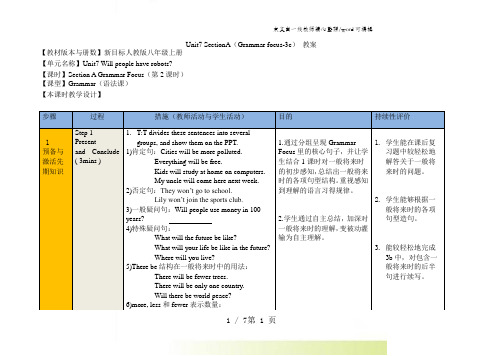
Unit7 SectionA(Grammar focus-3c)教案【教材版本与册数】新目标人教版八年级上册【单元名称】Unit7 Will people have robots?【课时】Section A Grammar Focus(第2课时)【课型】Grammar(语法课)【本课时教学设计】步骤过程措施(教师活动与学生活动)目的持续性评价1预备与激活先期知识Step 1Presentand Conclude( 3mins )1.T:T divides these sentences into severalgroups, and show them on the PPT.1)肯定句:Cities will be more polluted.Everything will be free.Kids will study at home on computers.My uncle will come here next week.2)否定句:They won’t go to school.Lily won’t join the sports club.3)一般疑问句:Will people use money in 100years?4)特殊疑问句:What will the future be like?What will your life be like in the future?Where will you live?5)There be结构在一般将来时中的用法:There will be fewer trees.There will be only one country.Will there be world peace?6)more, less和fewer表示数量:1.通过分组呈现GrammarFocus里的核心句子,并让学生结合1课时对一般将来时的初步感知,总结出一般将来时的各项句型结构。
人教新目标英语八年级上册unit7 SectionB (3a-3c)教案

人教新目标英语八年级上册Unit 7 Will people have robots?(Section B 3a-3c)Teaching aims:1.Knowledge and abilities:(1)students can master the new words: probably, during,holiday, possible.(2)By reading 3a,studentsn can master the usage of theSimple Future Tense in the passage, understand the writer`s contents、master the set phrases and conjunctions .(3)Students can practice listening and speaking. (3b)(4)Students can use the Simple Future Tense correctly todescribe their future life. (3c)2.Procedures and ways:Multi-media teaching /task-based language teaching/groupworkFirst ,Students can read the passage to master some writing skills .Then ,students finish 3b to master more details about writing.Finally, students can write a composition about their future life.3.Emotion 、attitude and valueEveryone should have his dream and try his bet to realize them。
八年级英语上册 Unit 7 Will people have robots Section B 2a-2e教学案(无答案)(新版)人教新目标版
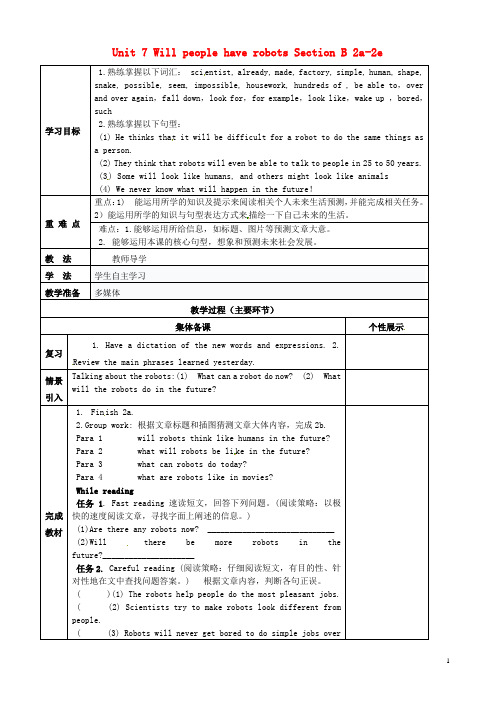
(4) We never know what will happen in the future!
重难点
重点:1)能运用所学的知识及提示来阅读相关个人未来生活预测,并能完成相关任务。2)能运用所学的知识与句型表达方式来 描绘一下自己未来的生活。
( (3) Robots will never get bored to do simple jobs over and over again.
( (4) Humans will have more work to do it the future.
( (5) Space rockets seemed possible a hundred ye ars ago.
Unit 7 Will people have robots Section B2a-2e
学习目标
1.熟练掌握以下词汇:sci entist, already, made, factory, simple, human, shape, snake, possible, seem, impossible, housework, hundreds of , be able to,over and over again,fall down,look for,for example,look like,wake up,bored,such
While reading
任务1. Fast reading速读短文,回答下列问题。(阅读策略:以极快的速度阅读文章,寻找字面上阐述的信息。)
(1)Are there any robots now? _____________________________
八年级英语上册 Unit 7 Will people have robots Section B 1a-1e教学案(无答案)(新版)人教新目标版
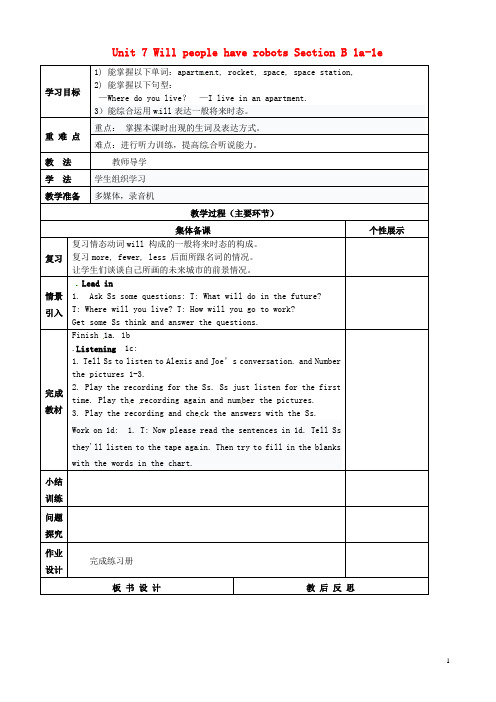
问题探究
作业设计
完成练习册
板书设计
教后反思
1.words:
apartment, rocket, space, space s tatio you live?
I live in an apartm ent.
Unit 7 Will people have robots Section B1a-1e
学习目标
1)能掌握以下单词:apartm en t, rocket, space, space station,
2)能掌握以下句型:
—Where do you live?—I live in an apartment.
3)能综合运用w ill表达一般将来时态。
重难点
重点:掌握本课时出现的生词及表达方式。
难点:进行听力训练,提高综 合听说能力。
教法
教师导学
学法
学生组织学习
教学准备
多媒体,录音机
教学过程(主要环节)
集体备课
个性展示
复习
复习情态动词will构成的一般将来时态的构成。
复习more, fewer, less后面所跟名词的情况。
完成教材
Finish 1a. 1b
.Listening1c:
1. Tell Ss to listen to Alexis and Joe’s conversation. and Number the pictures 1-3.
2. Play the recording for the Ss. Ss just listen for the first time. Play th e recording again and num ber the pictures.
人教版2020年八年级英语上册Unit7Willpeoplehaverobots讲义(新版)人教新目标版

Unit 7 Will people have robots? (讲义) Words and expressionspaper /'peɪpə(r)/ n. 纸;纸张pollution /pə'luːʃn/ n. 污染;污染物prediction /prɪ'dɪkʃn/ n. 预言;预测future /'fjuːtʃə(r)/ n. 将来;未来pollute /pə'luːt/ v. 污染environment /ɪn'vaɪrənmənt/ n.环境planet/'plænɪt/ n. 行星earth /ɜː(r)θ/n. 地球;世界plant /plɑːnt/ v. 种植n. 植物part /pɑː(r)t/ n. 参加;参与;部分play a part 参与(某事)peace /piːs/ n. 和平sea /siː/ n. 海;海洋sky /skaɪ/ n. 天空astronaut /'æstrənɔːt/ n. 宇航员;航天员apartment /ə'pɑː(r)tmənt/ n. 公寓套房rocket /'rɒkɪt/ n. 火箭space /speɪs/ n. 太空;空间space station 太空站;宇宙空间站human /'hjuːmən/ adj. 人的n. 人servant /'sɜː(r)vənt/ n. 仆人dangerous /'deɪndʒərəs/ adj. 有危险的;不安全的already /ɔːl'redi/ adv.已经;早已factory /'fæktəri/ n. 工厂over and over again 多次;反复地believe /bɪ'liːv/ v.相信;认为有可能disagree /,dɪsə'griː/ v.不同意;持不同意见;有分歧even /'iːvn/ adv.甚至;连;愈加hundreds of 许多;大量shape /ʃeɪp/ n. 形状;外形fall /fɔːl/ v. (fell /fel/) 倒塌;跌倒;掉落fall down 突然倒下;跌倒;倒塌inside /ɪn'saɪd/ adv. & prep. 在……里面look for 寻找;寻求possible /'pɒsəbl/ adj. 可能存在或发生的;可能的impossible /ɪm'pɒsəbl/ adj. 不可能存在或发生的;不可能的side /saɪd/ n. 一方(的意见、态度、立场)probably /'prɒbəbli/ adv.很可能;大概during /'djʊərɪŋ/ prep. 在……期间holiday /'hɒlədeɪ/ n. 假期;假日word /wɜː(r)d/ n. 单词;词Nick /nɪk/ 尼克(男名)James /dʒeɪmz/ 詹姆斯(男名)White /waɪt/ 怀特(姓)Role-playNick: What are you reading, Jill?Jill: It’s a book about the future.Nick: Sounds cool. So what will the future be like?Jill: Well, cities will be more crowded and polluted. There will be fewer trees and the environment will be in great danger. Nick: That sounds bad! Will we have to move to other planets? Jill: Maybe. But I want to live on the earth.Nick: Me, too. Then what can we do?Jill: We can use less water and plant more trees. Everyone should play a part in saving the earth.Grammar focus’ll=willwon’t=will not3a Fill in the blanks with more, less or fewer.1.In the future, there will be fresh water because there will bepollution in the sea.2.In 100 years, there will be cars because there will bepeople in the cities.3.There will be jobs for people because robotswill do the same jobs as people.4.I think there will be cities because people will buildbuildings in the country.5.In 50 years, people will have free time because therewill be things to do.Reading2b Read the article and match each paragraph with the questionsit discusses.Paragraph 1 Will robots think like humans in thefuture? Paragraph 2 What will robots be like in the future? Paragraph 3 What can robots do today?Paragraph 4 What are robots like in movies?Do You Think You Will Have Your Own Robot?1.When we watch movies about the future, we sometimes see robots. Theyare usually like human servants. They help with the housework and do jobs like working in dirty or dangerous places.2.Today there are already robots working in factories. Some can helpto build cars, and they do simple jobs over and over again. Fewer people will do such jobs in the future because they are boring, but robots will never get bored.3.Scientists are now trying to make robots look like humans and dothe same things as we do. Some robots in Japan can walk and dance.They are fun to watch. However, some scientists believe that although we can make robots move like people, it will be difficult to make them really think like a human. For example, scientist James White thinks that robots will never be able to wake up and know where they are. But many scientists disagree with Mr. White. They think that robots will even be able to talk like humans in 25 to 50 years.4.Some scientists believe that there will be more robots in the future.However, they agree it may take hundreds of years. These new robots will have many different shapes. Some will looks like humans, and others might look like animals. In India, for example, scientists made robots that look like snakes. If buildings fall down with people inside, these snake robots can help look for people under thebuildings. This was not possible 20 years ago, but computers and rockets also seemed impossible 100 years ago. We never know what will happen in the future!Exercises一、填空1.Our (环境) will be better if we protect it.2.The (预言) didn’t come true.3.His uncle is an (宇航员).4.He worked in a (太空站) last year.5.There are five (仆人) in his family.6.Tom was surprised by all the (pollute) on the beach.7.We hope the world will be (peace).8.Be away from the tiger. It’s(danger).9.It’s too late. I (agree) that we go there today.10.It seems (possible) that people can fly.二、单选( )11. Please pass me two .A.pieces of paperB. pieces of papersC. pieces paperD. piece papers( )12. Let’s play a part the room.A. cleanB. cleaningC. to cleanD. in cleaning( )13. volunteers will give out leaflets(传单) to ask people to protect the wetlands(湿地).A. Two hundredsB. Hundreds ofC. Two hundred ofD. Hundred of( )14. , Tom! It’s time to get up and go to school.A. Wake upB. Make upC. Grow upD. Look up ()15. John will go to France on vacation this summer.A. possibleB. impossibleC. probablyD. probable( )16. It is difficult for a robot _ thesame things aperson does.A. doing; likeB. do; fromC. to do; asD. does; as( )17. —What are you doing in the room?—I’m my hat.A. looking afterB. looking forC. looking upD. looking like( )18. There are some students the classroom.A. cleanB. to cleaningC. cleaningD. cleans( )19. There are many clouds _ the sky.A. inB. onC. atD. to( )20. I think the movie is interesting. But he disagrees me.A. inB. withC. toD. of( )21. It’s7 p.m., but the children are not backyet.A. alsoB. eitherC. alreadyD. only( )22. If there are people driving, there will be _air pollution.A. less; lessB. less; fewerC. fewer; fewerD. fewer;less( )23. —Willthere be schools in the future?—I think students will study at home on the Internet.A. Yes, there will.B. No, there won’t.C. Yes, there is.D. No, there isn’t.三、翻译24.你同意将来会有更多的污染吗?Do you that there will be more pollution?25.你能告诉我未来是什么样子吗?Can you tell me what the ? 26.你必须反复地练习才能做得很好。
人教版新目标八年级英语上册Unit 7讲义及重点总结

新目标八年级上册Unit 7 Will people have robots? 讲义一、词性转换1.paper n. 纸张(不可数)2.pollution n. 污染物pollute v. 污染3.prediction n. 预言;预测predict v. 预测4.astronaut n. 宇航员5.dangerous a. 有危险的danger n. 危险6.disagree v. 不同意7.possible a. 可能的impossible a. 不可能的8.probably adv. 很可能二、短语归纳1.play a part 参加(某事)2.space station 太空站3.over and over again 多次;反复地4.hundred of 许多;大量5.fall down 突然倒下;跌倒6.look for 寻找;寻求7.in great danger 在巨大的危险中8.help with 帮助9.for example 举例10.in the future 在未来11.look like 看起来像12.wake up 醒来13.fewer people更少的人14.14. less free time更少的空闲时间15.15. in ten years 10年后(提问用How soon)16.fall in love with…爱上…17.hundreds of +名词复数数百/几百(概数,类似还有thousands of; millions of)18.the same as 和……相同19.A be different from B A与B不同20.wake up醒来21.get bored变得厌倦(get/become+形容词)22.keep a bird 养一只鸟23.lots of /a lot of许多+可数或不可数名词24.disagree with sb.不同意某人(的意见)disagree on sth. 不同意某事25.I don’t agree. = I disagree.我不同意26.on vacation度假27.help sb with sth 帮助某人做某事28.live in an apartment住在公寓里live on the earth 住在地球上29.besides与except =but(除…之外,不包括)30.be able to与can 能、会31.live on a space station 住在空间站32.over and over again 一次又一次33.10 years from now 今后10年34.be difficult to do 做……有困难35.the same …as 和……一样三、重难点深度解析1. Do you think there will be robots in people's homes? 你认为将来人们的家里会有机器人吗?Do you think...? 结构通常用来征求对方的意见或看法,后面接宾语从句,从句用陈述语序。
八年级英语上册 Unit 7 Will people have robots Section B 3a-Self Check教学案(新版)人教新目标版
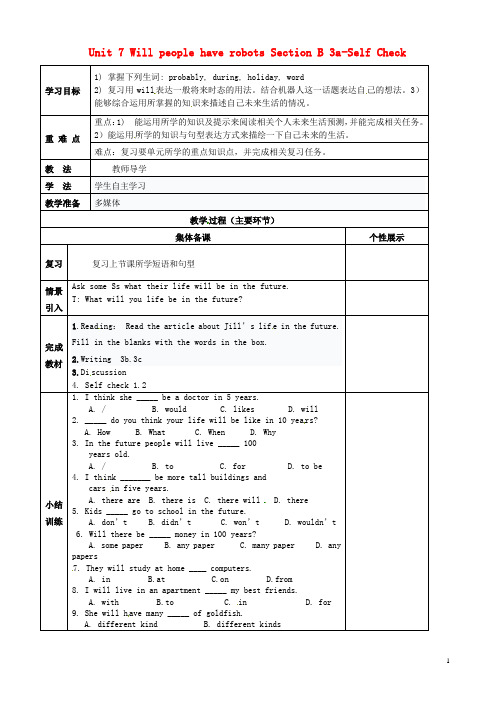
1.words:
probably, during, holiday, word
2.What will your…be like?
Unit 7 Will people have robots Section B3a-Self Check
学习目标
1)掌握下列生词: probably, during, holiday, word
2)复习用will 表达一般将来时态的用法。结合机器人这一话题表达自 己的想法。3)能够综合运用所掌握的知 识来描述自己未来生活的情况。
情景引入
Ask some Ss what their life will be in the future.
T: What will you life be in the future?
完成教材
1.Read ing:Read the article about Jill’s lif e in the future. Fill in the blanks with the words in the box.
重难点
重点:1)能运用所学的知识及提示来阅读相关个人未来生活预测,并能完成相关任务。2)能运用 所学的知识与句型表达方式来描绘一下自己未来的生活。
难点:复习要单元所学的重点知识点,并完成相关复习任务。
教法
教师导学
学法
学生自主学习
教学准备
多媒体
教学 过程(主要环节)
集体备课
个性展示
复习
复习上节课所学短语和句型
cars in five years.
A. there are B. there is C. there will D. there
5. Kids _____ go to school in the future.
英语教案三维目标模板初中八年级上册Unit7

英语教案三维目标模板初中八年级上册Unit7一、目标知识目标1.学习掌握有关节假日及活动的单词和词组。
2.能够正确理解并运用本单元所学的常用表达和句型。
3.能够正确运用一般过去时态来描述过去的经历和事件。
能力目标1.培养学生的英语听说读写能力,提高他们的综合语言运用能力。
2.培养学生的合作能力和解决问题的能力。
3.提高学生的独立学习和思考能力。
情感目标1.营造积极的学习氛围,培养学生的学习兴趣。
2.培养学生的团队合作精神和互助精神。
3.培养学生的自信心和积极心态。
二、过程活动安排1.Warm-up: 通过图片或视频展示激发学生对主题的兴趣。
2.Presentation: 教师介绍本单元重点词汇和句型,引导学生积极参与。
3.Practice: 学生分组进行对话练习,巩固所学知识。
4.Production: 学生完成写作任务,展示自己的语言表达能力。
5.Consolidation: 综合复习本单元内容,巩固学生学过的知识点。
教学方法1.任务型教学法:以任务为导向,激发学生学习兴趣。
2.合作学习法:倡导学生合作学习,促进学生互相合作、共同进步。
3.情境教学法:通过情境创设,帮助学生更好地理解和运用所学知识。
三、评价评价方式1.观察评价:观察学生在课堂活动中的表现和参与度。
2.口头评价:对学生的口语表达能力和听力理解能力进行评价。
3.书面评价:审阅学生的写作作业,评估他们的语言表达能力。
评价标准1.学生是否能准确掌握本单元重点词汇和句型。
2.学生是否能流利地运用一般过去时态进行口头表达。
3.学生是否积极参与课堂活动,展现出团队合作精神。
以上就是英语教案三维目标模板初中八年级上册Unit7的详细教学内容,希望学生们能够在本次教学过程中取得良好的学习成绩。
【人教版】新目标八年级英语上册:Unit7单元教学设计

【人教版】新目标八年级英语上册:Unit7单元教学设计一. 教材分析人教版新目标八年级英语上册Unit7主要围绕着“节假日”这一主题展开,通过学习本单元,学生能够掌握有关节假日的一些基本词汇和表达方式,如Christmas, New Year’s Day, Easter等,同时能够运用所学生所学知识进行简单的交流和表达。
本单元包括3个会话和3个语法练习,以及相关的阅读和写作任务。
二. 学情分析八年级的学生已经掌握了一些基本的英语知识,具备一定的听、说、读、写能力。
但是,对于一些特定的节假日词汇和表达方式可能还不够熟悉,同时也可能存在一些学生在口语表达上的困难。
因此,在教学过程中,需要注重词汇的讲解和口语的练习。
三. 教学目标1.知识目标:学生能够掌握本单元相关的节假日词汇和表达方式,如Christmas, New Year’s Day, Easter等,并能够运用所学知识进行简单的交流和表达。
2.能力目标:学生能够听、说、读、写与节假日相关的句子,提高英语综合运用能力。
3.情感目标:学生能够了解不同国家的节假日习俗,增强跨文化交际意识。
四. 教学重难点1.重点:掌握节假日词汇和表达方式,如Christmas, New Year’s Day,Easter等,以及能够运用所学知识进行简单的交流和表达。
2.难点:对于一些特定的节假日词汇和表达方式的运用,以及口语表达的流利性和准确性。
五. 教学方法1.交际法:通过模拟真实场景,让学生在实际语境中运用所学知识进行交流。
2.任务型教学法:通过完成各种任务,激发学生的学习兴趣,提高学生的参与度。
3.情境教学法:创设各种节假日情境,帮助学生理解和记忆相关词汇和表达方式。
六. 教学准备1.教师准备:准备好相关的教学材料,如PPT、单词卡片、练习册等。
2.学生准备:学生预习本单元内容,完成相关的预习任务。
七. 教学过程1.导入(5分钟)通过提问方式引导学生谈论他们喜欢的节假日,激发学生的兴趣和积极性。
英语人教版八年级上册Unit-7Will-people-have-robots

Unit 7 Will people have robots?(Section A 1a-2c)一、教材分析:(一)、本节教材的地位和作用本课是新目标英语八年级上册的第七单元的Section A 的第一部分,本节教材所涉及内容在中考中占有相当重要的地位。
本节教材围绕着“将来发生的事”展开,要求学生学习和运用“will+v(原)”构成的一般将来时态。
本课教学内容与学生的实际生活相关,可以利用学生的想象,引导学生运用简单的英语来描述将来的生活和事物。
在学习活动中,学生通过对将来发生的事情的描述,促进学生对美好未来的憧憬。
(二)、教学目标:(1)知识与技能1.指导学生学习有关将来要发生的事情的表达及语法知识点“一般将来时” 。
2.培养学生的口头表达能力、阅读理解能力和写作能力。
1. 学习有关的单词及词组:robot, paper, pollution, tree, subway, computer, will, won ’ t ,they’ll, fewer, be free, on paper, live to be, in 100 years, etc. 2. 学习重要句型:(1)People will have robots in their homes. (2)Will people have robots?. (3)Kids won’ t go to school. (4) There will be less pollution. 3. 掌握语法点:The Simple Future Tense ( 一般将来时) (1)教师自制的多媒体课件;(2)上课环境为多环境。
(2)情感目标:通过学生对自己in five years 的展望,设想自己五年,十年,甚至是二十年后的生活,贴近学生生活实际,符合学生好奇的心理,激发学生浓厚的学习兴趣。
(3) 学习策略:通过任务型的教学,让学生学会自主学习,归纳总结,培养主动学习的能力。
八年级英语上册Unit7Willpeoplehaverobots(第1课时)单词课教案人教新目标版
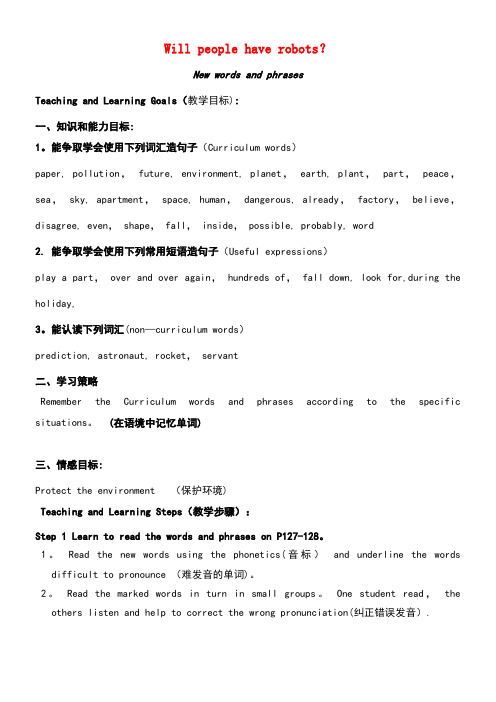
Will people have robots?New words and phrasesTeaching and Learning Goals(教学目标):一、知识和能力目标:1。
能争取学会使用下列词汇造句子(Curriculum words)paper, pollution, future, environment, planet, earth, plant, part, peace,sea, sky, apartment, space, human, dangerous, already, factory, believe,disagree, even, shape, fall, inside, possible, probably, word2. 能争取学会使用下列常用短语造句子(Useful expressions)play a part, over and over again, hundreds of, fall down, look for,during the holiday,3。
能认读下列词汇(non—curriculum words)prediction, astronaut, rocket, servant二、学习策略Remember the Curriculum words and phrases according to the specific situations。
(在语境中记忆单词)三、情感目标:Protect the environment (保护环境)Teaching and Learning Steps(教学步骤):Step 1 Learn to read the words and phrases on P127-128。
1。
Read the new words using the phonetics(音标)and underline the words difficult to pronounce (难发音的单词)。
人教版(新目标)英语八年级上unit7教案
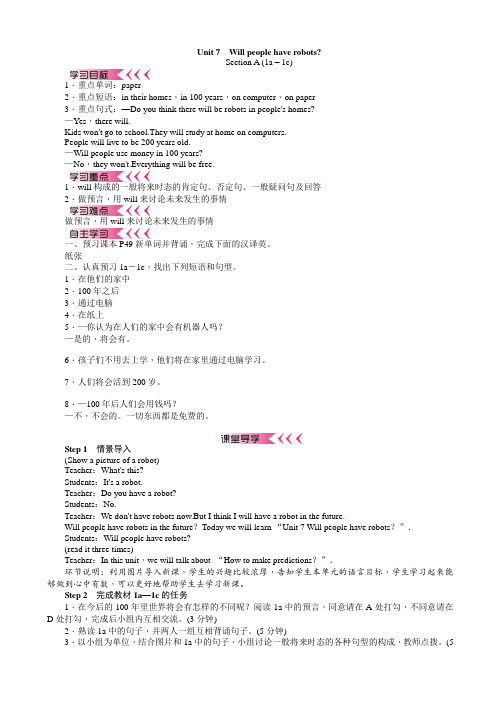
Unit 7Will people have robots?Section A (1a-1c)1.重点单词:paper2.重点短语:in their homes,in 100 years,on computer,on paper3.重点句式:—Do you think there will be robots in people's homes?—Yes,there will.Kids won't go to school.They will study at home on computers.People will live to be 200 years old.—Will people use money in 100 years?—No,they won't.Everything will be free.1.will构成的一般将来时态的肯定句、否定句、一般疑问句及回答2.做预言,用will来讨论未来发生的事情做预言,用will来讨论未来发生的事情一、预习课本P49新单词并背诵,完成下面的汉译英。
纸张____________二、认真预习1a-1c,找出下列短语和句型。
1.在他们的家中____________________2.100年之后____________________3.通过电脑____________________4.在纸上____________________5.—你认为在人们的家中会有机器人吗?—是的,将会有。
________________________________________________________________________6.孩子们不用去上学,他们将在家里通过电脑学习。
________________________________________________________________________7.人们将会活到200岁。
【人教版】新目标八年级英语上册:Unit 7 单元教学设计
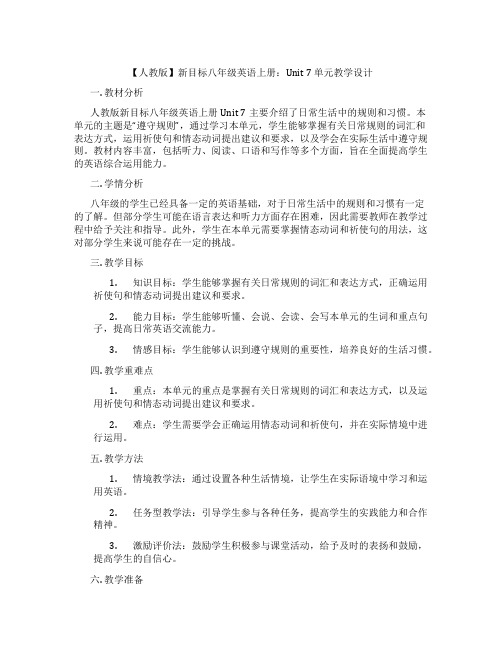
【人教版】新目标八年级英语上册:Unit 7 单元教学设计一. 教材分析人教版新目标八年级英语上册Unit 7主要介绍了日常生活中的规则和习惯。
本单元的主题是“遵守规则”,通过学习本单元,学生能够掌握有关日常规则的词汇和表达方式,运用祈使句和情态动词提出建议和要求,以及学会在实际生活中遵守规则。
教材内容丰富,包括听力、阅读、口语和写作等多个方面,旨在全面提高学生的英语综合运用能力。
二. 学情分析八年级的学生已经具备一定的英语基础,对于日常生活中的规则和习惯有一定的了解。
但部分学生可能在语言表达和听力方面存在困难,因此需要教师在教学过程中给予关注和指导。
此外,学生在本单元需要掌握情态动词和祈使句的用法,这对部分学生来说可能存在一定的挑战。
三. 教学目标1.知识目标:学生能够掌握有关日常规则的词汇和表达方式,正确运用祈使句和情态动词提出建议和要求。
2.能力目标:学生能够听懂、会说、会读、会写本单元的生词和重点句子,提高日常英语交流能力。
3.情感目标:学生能够认识到遵守规则的重要性,培养良好的生活习惯。
四. 教学重难点1.重点:本单元的重点是掌握有关日常规则的词汇和表达方式,以及运用祈使句和情态动词提出建议和要求。
2.难点:学生需要学会正确运用情态动词和祈使句,并在实际情境中进行运用。
五. 教学方法1.情境教学法:通过设置各种生活情境,让学生在实际语境中学习和运用英语。
2.任务型教学法:引导学生参与各种任务,提高学生的实践能力和合作精神。
3.激励评价法:鼓励学生积极参与课堂活动,给予及时的表扬和鼓励,提高学生的自信心。
六. 教学准备1.教师准备:备好本单元的教学课件、教案、听力材料等。
2.学生准备:预习本单元的生词和句子,做好上课的准备。
七. 教学过程1.导入(5分钟)教师通过提问方式引导学生谈论日常生活中遵守规则的重要性,激发学生的学习兴趣。
2.呈现(10分钟)教师展示本节课的主要内容,包括生词、短语和句子,让学生初步感知和理解。
人教新目标八年级英语上册unit7教案教学设计

针对学生的个体差异,教师应分层教学,给予每个学生充分的关注和指导,激发学生的学习兴趣,帮助他们克服学习困难,提高英语综合运用能力。同时,注重情感教育,引导学生关注环保问题,培养他们的社会责任感。
三、教学重难点和教学设想
(一)教学重难点
1.重点:本章节的核心词汇和短语,如“effect”, “environment”, “pollution”, “protect”, “waste”, “recycle”等;一般现在时的用法及在句子中的应用;阅读理解能力的提升。
(五)总结归纳(500字)
1.教师引导学生回顾本节课所学内容,总结环保词汇、一般现在时态和阅读理解策略。
2.学生分享学习收获,交流学习心得,教师给予鼓励和指导。
3.教师强调环保意识的重要性,鼓励学生在日常生活中践行环保,为保护地球家园贡献自己的力量。
五、作业布置
为了巩固本节课所学知识,提高学生的英语综合运用能力,特布置以下作业:
3.学生能够运用所学知识进行信息提取、分析和整合,通过阅读理解练习,提高阅读速度和准确度。
4.学生能够在口语交流中,运用所学句型和表达方式,就环境问题展开讨论,提出自己的观点和建议。
(二)过程与方法
1.通过小组合作学习,培养学生团队协作精神和沟通能力,提高学习效率。
2.利用多媒体教学资源,如图片、视频等,创设生动、真实的语言环境,激发学生的学习兴趣,提高学生的英语听说能力。
3.阅读作业:
-阅读一篇关于环保的英文文章,提高阅读理解能力,并尝试总结文章中的关键信息,为课堂上的阅读分享做好准备。
4.实践作业:
-调查周围环境中的问题,如垃圾分类、能源浪费等,提出解决方案,并撰写调查报告,以培养学生的实践能力和环保意识。
人教版新目标英语八年级上册Unit 7 教案(单元全套)(精修版)
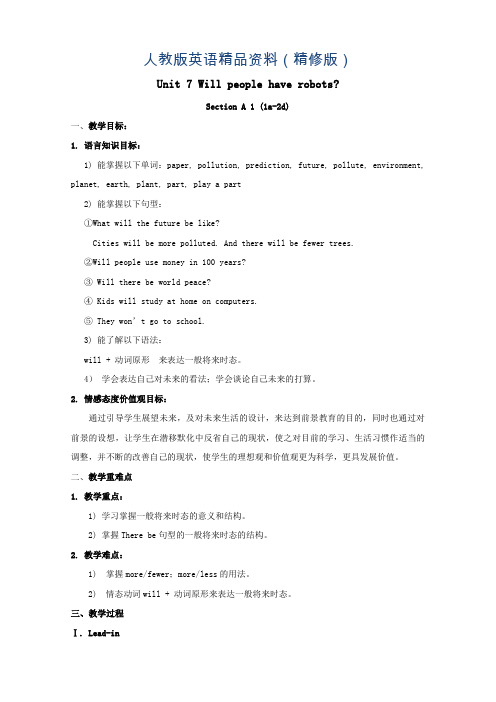
人教版英语精品资料(精修版)Unit 7 Will people have robots?Section A 1 (1a-2d)一、教学目标:1. 语言知识目标:1) 能掌握以下单词:paper, pollution, prediction, future, pollute, environment, planet, earth, plant, part, play a part2) 能掌握以下句型:①What will the future be like?Cities will be more polluted. And there will be fewer trees.②Will people use money in 100 years?③ Will there be world peace?④ Kids will study at home on computers.⑤ They won’t go to school.3) 能了解以下语法:will + 动词原形来表达一般将来时态。
4)学会表达自己对未来的看法;学会谈论自己未来的打算。
2. 情感态度价值观目标:通过引导学生展望未来,及对未来生活的设计,来达到前景教育的目的,同时也通过对前景的设想,让学生在潜移默化中反省自己的现状,使之对目前的学习、生活习惯作适当的调整,并不断的改善自己的现状,使学生的理想观和价值观更为科学,更具发展价值。
二、教学重难点1. 教学重点:1) 学习掌握一般将来时态的意义和结构。
2) 掌握There be句型的一般将来时态的结构。
2. 教学难点:1)掌握more/fewer;more/less的用法。
2)情态动词will + 动词原形来表达一般将来时态。
三、教学过程Ⅰ. Lead-in1. 在大屏幕上向学生展示一些机器人的图片,让学生们说出谈论自己的未来的工作,对工作的打算等:What do you want to be when you grow up?Ss: I want to be a scientist.T: How are you going to do that?Ss: I’m going to study science hard.….2. 学生们根据图片来引导出机器人这一话题。
- 1、下载文档前请自行甄别文档内容的完整性,平台不提供额外的编辑、内容补充、找答案等附加服务。
- 2、"仅部分预览"的文档,不可在线预览部分如存在完整性等问题,可反馈申请退款(可完整预览的文档不适用该条件!)。
- 3、如文档侵犯您的权益,请联系客服反馈,我们会尽快为您处理(人工客服工作时间:9:00-18:30)。
八年级英语上册 unit7单元教学设计人教
新目标版
初二英语Unit7 Reading教学设计方案
课题名称科目教学时间学习者分析 Would you mind keeping your voice down English Period 1 (45minutes) Students study in Hui Long middle school, They live in the countryside. Students have learned English for two years. They can know hundreds of words and sentences, they can master the present tense, the past tense and the present continuous tense, But they can simply understand the strategy of reading . They still need me to help them train how to use the strategy of reading.. 一、情感态度与价值观 1. To enable Ss to behave politely in public places and in our daily life.
2. To encourage Ss to love our homes. 二、过程与方法1. Let Ss read in since by themselves ,then read it exactly , next finish the homework about the passage.
2. Read the strategy of reading loudly. 三、知识与技能 1. To train student’s reading ability xxprehension.
2. To train student’s ability of getting information. 教学重点、1. Help Ss master how to use the strategy of
reading. 难点 2. Help Ss improve their reading xxprehension. 教学资源 Muti-media Unit7 Reading 教学活动过程描述年级 Grade 8 教学目标 1.师生互动,导入新课教学活动1 S: Would you mind turning down the music T: Sorry, I’ll do it right away. It’s polite to keeping your voice down in public. Follow me to read the title ---Would you mind keeping your voice down Look at the picture .How many rules of etiquette can you see being broken 教学活动2 2. 显示图片,回忆旧知 Ask and answer: 1) What’s she doing --- She’s eating something and dropping litter on the bus . 2) What’s the man doing--- He’s talking on the phone loudly.
3) What’s he doing --- He’s smoking. 4) What’s the boy doing ---He’s spitting. 5) What’s they doing--- They’re talking loudly in public. T: Listen to me carefully. What could you say if you see someone 用心爱心专心 1
you know breaking the rules of etiquette Please make your own conversations and be ready to act out. (show time) 教学活动3 3.分三个步骤进行阅读,完成相应任务。
Step I,: Pre-reading T: Open your books and turn to page ’ll give you five minutes to read the test
silently, Which reading strategy should we take care in reading?Underline the beautiful and difficult sentences. S: … Step II: While reading Fast reading True or False 1. Etiquette means normal and polite social behavior. ( ) 2. Etiquette is not the same in every culture or in every situation. ( ) 3. We should take care not to cough or sneeze loudly in public. ( ) 4. Dropping litter in other countries is allowed. () Step III: careful reading Answers the questions 1. If we see someone breaking the rules lf etiquette, What should we say 2. If someone is smoking on a bus ,what should you say you see someone you know dropping litter , what should you say
教学活动 4 4.归纳总结,知识迁移。
1)Let’s enjoy beautiful and difficult sentences , and try your best remember them. 2)Grammar Allow : 主动句, allow sb to do sth 被动句,be allowed to do sth 动词不定式短语做主语,谓语用单数It’s + adj (for sb ) + to do sth 动名词短语做主语,谓语用单数Doing sth. Is …动词做表语的结构:主语+ be + to do/ doing 3)用所学语法点,完成相应练习题。
4) Disscussion: which behavior is polite or impolite in public places
and in our daily life ?用心爱心专心 2。
